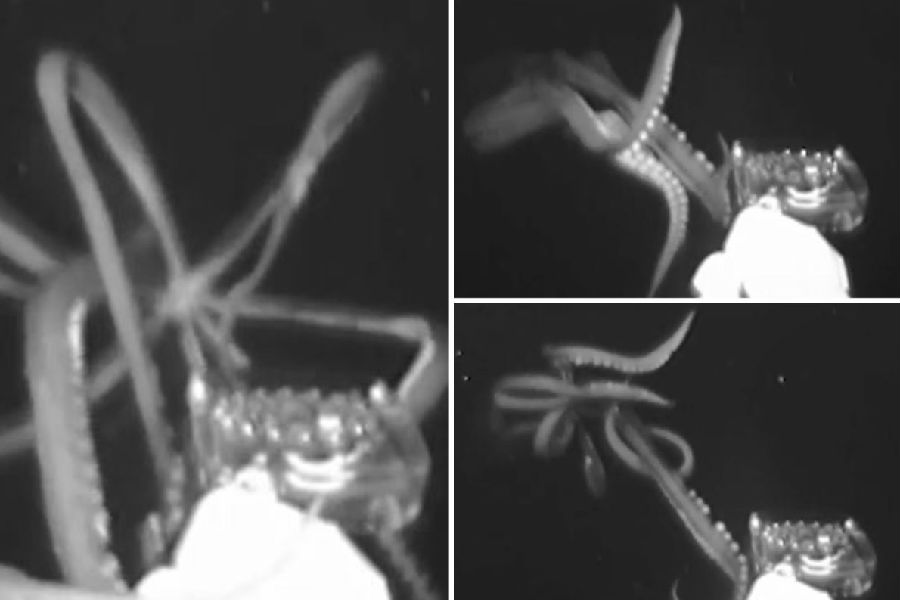(单词翻译:单击)
The footage you’re watching right now is of a ten-foot long juvenile giant squid.
你现在看到的画面中是一条十英尺(约3米)长的幼年巨型乌贼。
We’ve only captured the giant squid on camera in its natural habitat once before.
到现在为止,我们只在巨型乌贼的自然栖地拍到过一次它的真容。
This elusive creature is infamously difficult to study and observe,
这种神出鬼没的生物很难研究,也很难观察到,
but thanks to advances in deep ocean robotics,
好在我们的深海机器人技术进步了,
we can take a new look into previously unexplored oceanic depths.
从前未曾探索过的深海我们也能重新审视了。
The camera system that captured this jaw-dropping shot is called ‘Medusa’,
拍摄到这张令人瞠目结舌的照片的相机系统叫“美杜莎”,
because it includes a lure made of LED lights designed to resemble a bioluminescent jellyfish,
这个系统配备了一个伪装成生物发光水母的LED灯作诱饵,
a preferred snack of many deep sea creatures, including the giant squid.
而许多深海生物,包括大乌贼,都喜欢拿发光水母当零食。
Medusa represents an exciting new breakthrough in deep sea technology.
“美杜莎”代表深海技术取得了振奋人心的新突破。
It uses novel techniques to help us understand more about the deep sea environment and the creatures that live there,
这一突破运用新技术帮助我们进一步了解到深海环境以及生活在那里的生物,
hopefully helping us protect species that we know relatively little about, like the giant squid, in the face of changing oceans.
还有望在海洋生态变化的形势下,帮助我们保护我们知之甚少的这些物种,比如巨型乌贼。
And scientists have been working for decades to make this kind of ocean-exploring tech better.
几十年来,科学家们一直在努力完善这种海洋探索技术。
The Monterey Bay Aquarium Research Institute, for example, has been a leader in this development,
在这方面,拥有海底测绘机器人, 水下机器人Doc Ricketts和Ventana等
with deep sea exploring robots like the seafloor mapping AUV, the Doc Ricketts ROV, and Ventana.
多款深海探测机器人的蒙特雷湾水族馆研究所(MBARI)一直发挥着先驱作用。
Advances like this are important because many oceanographers believe that more traditional ocean-exploring tech is too bright and disturbing—
这样的进步很重要,因为许多海洋学家都认为,传统海洋探测技术亮度太大,容易惊扰到深海生物——
essentially, it’s too disruptive to capture footage of deep ocean creatures behaving naturally.
主要是会妨碍捕捉深海生物在自然状态下的行为。
Their behavior would be altered by the presence of such a device.
他们会因为这样一个装置的存在而改变自己的行为方式。
Medusa is one example of a less intrusive observation system,
美杜莎则代表了侵犯性不那么强的新型观测系统,
as it hangs on a line that can extend up to two thousand meters,
这款相机被绑在了一条可以延伸2000米的绳子上,
allowing scientists back on the boat to keep a respectful distance.
这样一来,科学家就可以保持足够的距离,在船上进行观测了。
And it uses red light to illuminate what it’s seeing, which scientists hypothesize most deep sea creatures can’t detect.
而且,这个系统用的照明工具是红光,因为科学家们猜测,大多数深海生物都无法探测到红光。
This idea was given new supporting evidence when the Medusa team captured this new giant squid footage,
当美杜莎团队捕捉到这段巨型乌贼的镜头时,这一观点得到了进一步的印证,
as the squid wasn’t scared off by the red light that helps Medusa’s cameras see in the dark.
因为乌贼没有被帮助美杜莎照相机在黑暗中看清东西的红光吓跑。

Another collaborative team with MBARI is also using red light and several other strategies
与MBARI合作的另一个团队也研发出了一种能够降低干扰的新工具,名为“Mesobot”机器人,
to minimize disturbance in a new vehicle called the Mesobot.
用到的也是红光,外加其他一些手段。
It’s an unassuming 1.2 meters tall and about 250 kilograms, really quite small for an oceangoing robot,
这款机器人个头很不起眼,只有1.2米高,约250公斤重,在海底探测机器人中间真的算很小了,
making it able to fulfill its mission: to track individual organisms for hours at a time
这也方便了它完成使命:在不打扰单个生物体的自然行为的前提下,
without disrupting their natural behavior, like a little robotic private investigator!
一连数小时地追踪它们,就像一个私家侦探机器人一样!
It’s a hybrid remotely operated vehicle that moves very slowly
它还是一款移动速度比较缓慢的混合动力遥控机器人——
using large, slow-turning thrusters to avoid disturbing the water around its target,
为了避免扰动目标周围的水流,该机器人搭载的是转速较慢的大型推进器,
and it can track an individual animal as it swims or drifts with the currents.
单个目标游动或是随着水流漂移时也能实现跟踪。
And the Mesobot is not just stalking deep sea creatures—
这款Mesobot机器人不仅能跟踪深海生物——
it also aims to help us understand more about what this part of the ocean is really like.
还有望帮助我们进一步了解某片海域的真实情况。
It will take measurements of salinity, temperature, and dissolved oxygen as it moves
在移动时完成测量某海域的盐度、温度和溶解氧等数据,
and collect biological samples that will eventually yield DNA from tiny or shy creatures that may have escaped detection.
同时收集生物样本,最终为我们提供比较小或是比较害羞,之前未曾被我们发现的动物的DNA。
Researchers hope this will shed more light on a relatively mysterious part of the ocean:
研究人员希望,这一技术能更多地揭示海洋下相对神秘的地带:
the mesopelagic zone, also known as the ‘ocean twilight zone’.
中远洋带,又称“海洋朦胧地带”。
This is the area about 200 to 1,000 meters below the ocean surface where the light from the sun almost entirely disappears.
该地带为海平面以下200~1000米的区域,在这里,阳光几乎已经消失得无影无踪。
It’s far deeper than human divers can swim,
这里比人类潜水员能到达的地方要深得多,
and squid, salps, eels, sharks and many kinds of fish thrive here.
乌贼、海参、鳗鱼、鲨鱼,还有许多种鱼类都在这里繁衍生息。
Some scientists hope the Mesobot will be able to tell us more about how life in this understudied part of the ocean lives naturally,
一些科学家希望,Mesobot机器人能够揭示更多这一尚未被充分研究的海域的生物自然的生活状态,
and how it may change as the ocean faces threats like overfishing and climate change.
以及海洋陷入过度捕捞以及气候变化等诸多威胁会给它们造成怎样的影响。
The Mesobot has already undergone its open ocean trials
目前,这款Mesobot机器人已经经过远洋试验了,
and hopes to be deployed on real data-collecting missions soon to help us understand more of the ocean than we ever have before.
希望能很快投入真正的数据收集任务,帮助我们以前所未有的姿态了解深海地带。
After all, thanks to amazing space probe technology, we know way more about what the surface of Mars looks like than we do about the ocean.
毕竟,凭借了不起的空间探索技术,我们对火星表面的了解已经远超我们对深海的了解。
We just need to figure out how to study it—
我们只需弄清楚研究方法,
and technology like Medusa, the Mesobot, and hopefully many more ocean-venturing robots will bring us one step closer to that goal.
美杜莎,Mesobot这样的机器人技术——顺利的话,未来还会有更多海洋探索机器人——就会帮助我们朝着这一目标迈进。
For even more oceanic exploration, check out this video here
想了解更多的海洋探索知识,不妨看看这段视频吧,
and make sure you subscribe to Seeker for all your exciting robotics news.
还有,别忘了订阅,掌握各种各样振奋人心的机器人新闻噢。
Thanks for watching and we'll see you next time on Seeker.
感谢大家的收看,我们下期节目再见啦。


